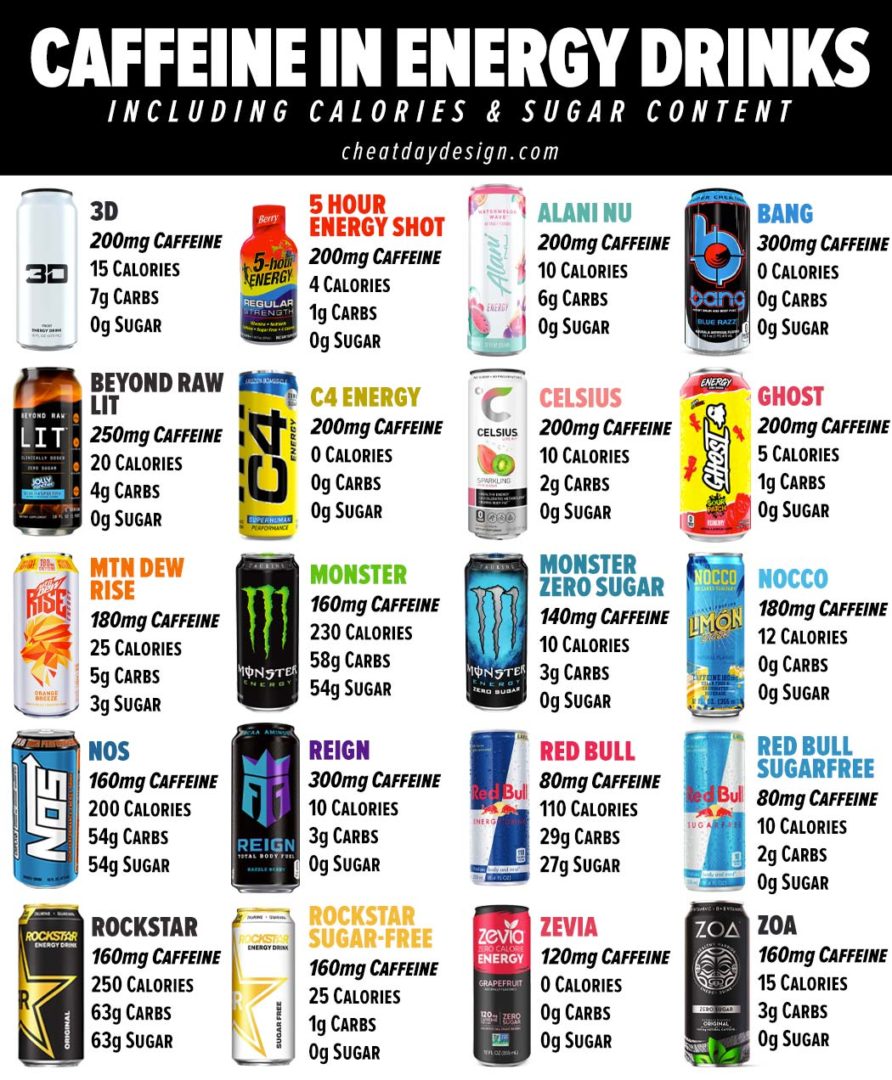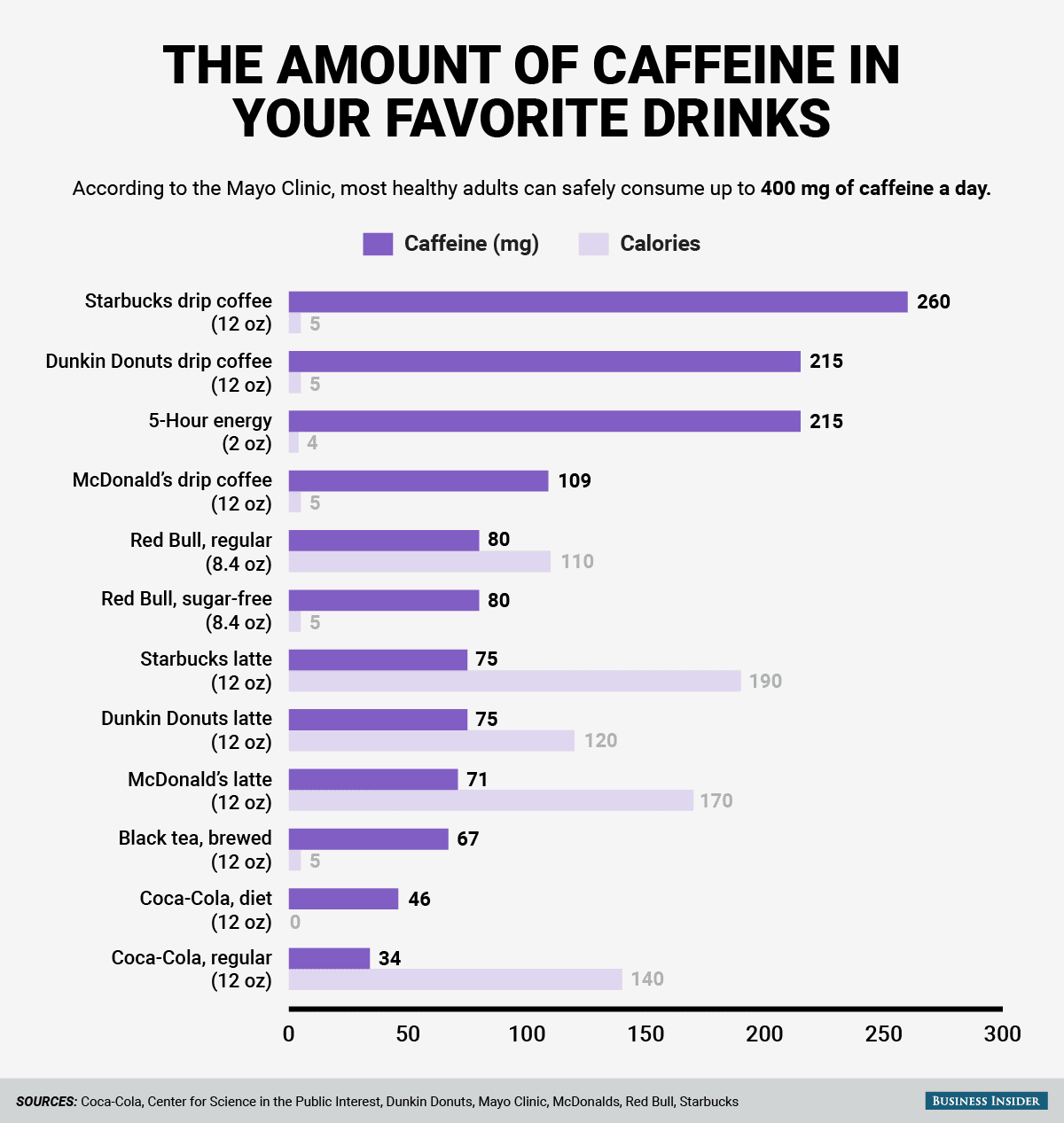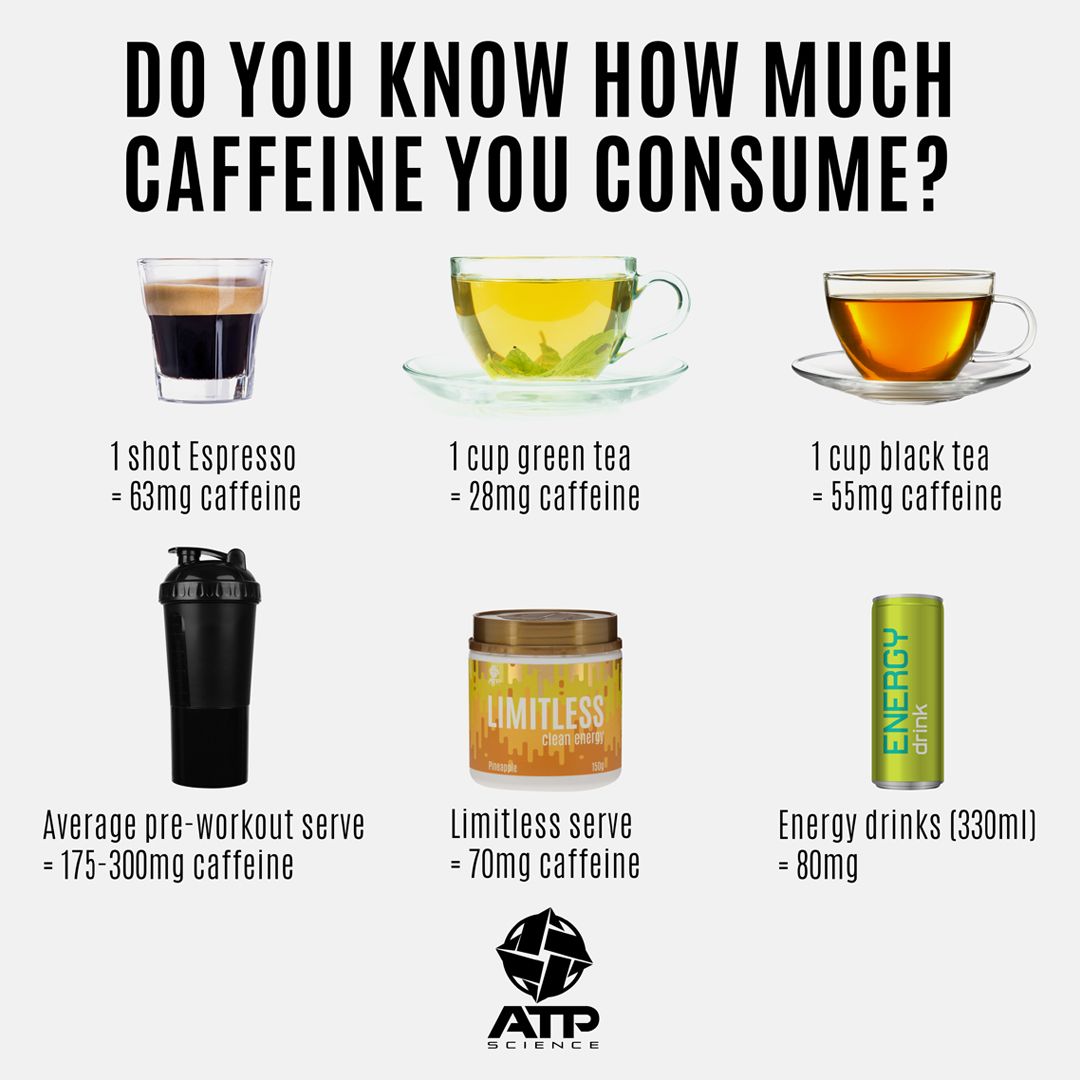Is There An Upper Limit For The Amount Of Caffeine That Is Healthy To Drink Each Day And What Are The Main Effects Of Caffeine
In 2015 the European Food Safety Authority published their Scientific Opinion on Safety of Caffeine. They concluded that it is safe for an adult to consume up to 200 mg of caffeine in a single serving and up to 400 mg of caffeine per day on a regular basis . Pregnant women are advised to consume a maximum of 200 mg caffeine per day. As well as being a stimulant and decreasing fatigue, caffeine also increases the heart rate and raises blood pressure. High doses of caffeine can cause insomnia, anxiety, tremors, and seizures. Due to individual physiological differences and tolerance levels from prior exposure, some people are more sensitive to the effects of caffeine than others, and should lower their caffeine intake accordingly.
How Much Caffeine Is In Celsius Energy Drinks
I love coffee. But sometimes cracking open an energy drink is more convenient. Plus, they come in some seriously addictive flavors.
My fellow busybodies might enjoy Celsius. Celsius sells fitness-oriented drinks marketed for people with an active lifestyle.
But before you launch your nervous system into hyperdrive, lets look at how much caffeine is in Celsius energy drinks. Ill also explain how they compare to other alternatives, such as Red Bull or Monster.
The Complete Guide To Starbucks Caffeine
Starbucks has some of the highest caffeine amounts of any coffee chain.
These charts were compiled using data from Starbucks in-store leaflets, their website, their app, and from independent laboratory tests. Its a big job keeping this up to date there are over 750 variations listed on this page!
Now showing listings for their Blonde Espresso based beverages and their Clover Brewed® coffee beverages.
Recommended Reading: What Are The Best Coffee Beans To Buy
What Are Some Tips For Reducing Caffeine Intake
- Avoid drinking caffeine late in the day so that it doesnt interfere with your sleep.
- If youre trying to cut back on caffeine, slowly reduce the amount youre consuming every day rather than quitting cold turkey.
- Choose decaf coffee and tea, or caffeine-free sodas instead of their caffeinated counterparts.
- Opt for herbal teas instead of energy drinks or coffee when you need an afternoon pick-me-up.
How Much Caffeine Is In Red Bull Compared To A Coffee

A can of Red Bull contains 80 milligrams of caffeine, while a cup of coffee from Starbucks can range from 70-140 milligrams. So while there is more caffeine in some coffees than there is in a can of Red Bull, it is not always the case. It really depends on the type and size of coffee you are drinking. In general, though, Red Bull will have more caffeine than your average cup of joe.
Read Also: Where Can I Buy Chicory Coffee
Pros And Cons Of Caffeine
Whether youre drinking coffee, tea, caffeinated soft drinks or even hot chocolate, low doses of caffeine can typically make you feel more alert and energetic. At higher doses though, some people find they feel anxious, irritable and unable to switch off or sleep. Over time, too much caffeine weakens the adrenal glands, depletes vital nutrients and interferes with hormonal balance. A cycle develops where greater amounts are needed to achieve the familiar high and symptoms such as headaches and indigestion can occur if we dont get our fix. In short, caffeine is addictive.
The scientific evidence seems to suggest that for healthy adults a moderate amount of tea and coffee is okay and wont damage your health. Other studies suggests that three to four cups of coffee are safe and even possibly beneficial for those with heart disease and diabetes. Other studies infer that one or two cups of coffee a day can help boost memory function in both young and older adults.
How Many Red Bulls Equal A Cup Of Coffee
This is a question that gets asked often, and unfortunately, there is no easy answer. The caffeine content in energy drinks can vary widely, and even different types of coffee can have different amounts of caffeine. So to get a definitive answer, you would need to know the exact caffeine content of the specific energy drink and coffee you’re comparing.
However, we can give some general guidelines. A typical 8oz cup of coffee has around 95mg of caffeine, while a can of Red Bull has about 80mg. So based on these numbers alone, you would need to drink slightly more than one cup of coffee to get the same amount of caffeine as one can of Red Bull.
Of course, there are other factors to consider as well. The caffeine in energy drinks is often combined with other ingredients that can give you a boost of energy, while the caffeine in coffee is usually unaccompanied. So even if the caffeine content is lower in an energy drink, you may still feel more energized after drinking it.
At the end of the day, it’s hard to say exactly how many Red Bulls equal a cup of coffee. It depends on a variety of factors, and ultimately it’s up to you to decide what works best for you.
You May Like: Nespresso Vertuo And Original Machine
Science Behind Red Bull
Since Red Bull has been around a long time there are mounting scientific studies testing its effectiveness. Here are a few.
- Alford, C., Cox, H., & Wescott, R. . The effects of red bull energy drink on human performance and mood. Amino acids, 21, 139-150. Study link
- Candow, D. G., Kleisinger, A. K., Grenier, S., & Dorsch, K. D. . Effect of sugar-free Red Bull energy drink on high-intensity run time-to-exhaustion in young adults. The Journal of Strength & Conditioning Research, 23, 1271-1275. study link
- Astorino, T. A., Matera, A. J., Basinger, J., Evans, M., Schurman, T., & Marquez, R. . Effects of red bull energy drink on repeated sprint performance in women athletes. Amino acids, 42, 1803-1808. study link
- Ragsdale, F. R., Gronli, T. D., Batool, N., Haight, N., Mehaffey, A., McMahon, E. C., … & Wilson, T. . Effect of Red Bull energy drink on cardiovascular and renal function. Amino acids, 38, 1193-1200. study link
Should Children Consume Energy Drinks
Although caffeine is safe to consume in moderation for the healthy general population, if children drink energy drinks, they should consume smaller quantities than adults, due to their smaller body mass.
Energy drinks which contain high levels of caffeine are not recommended for children. In the EU, with the exception of tea and coffee, it is mandatory for drinks which contain over 150 mg/l of caffeine to advise that their consumption is not recommended for children or pregnant and breastfeeding women. The caffeine content in mg per 100 ml will be provided in brackets. Product labels should be checked on energy drinks before giving them to children.
Childrens consumption of energy drinks should also be moderated due to the high sugar content.
Read Also: What Are The Best Caffeine Pills To Take
What Form Should Caffeine Labeling Take
Caffeine content labeling could take several forms: a declaration of caffeine content, such as contains mg caffeine per serving, below the Nutrition Facts or Supplement Facts panel a warning, such as contains high amounts of caffeine, on products containing more than a threshold level, such as 200mg or a label that visually represents that a product contains low, medium or high amounts of caffeine. As part of its ongoing effort to revamp nutrition labeling,39 the FDA should investigate how to effectively communicate caffeine content to consumers. Nutrition labeling should be made simpler, more consumer friendly, and more understandable, and this should include modifying labels so that they effectively communicate products’ caffeine content to consumers.
Foods And Drinks With Caffeine
We include products we think are useful for our readers. If you buy through links on this page, we may earn a small commission. Heres our process.
Caffeine is a substance thats naturally present in the leaves, seeds, and fruits of many plants, where it acts as an herbicide and insect repellant (
3 ).
The Food and Drug Administration generally recognizes caffeine as safe. Consuming up to 400 mg of caffeine per day has not been associated with adverse health effects in healthy adults .
One review study showed that 300 mg of caffeine per day in healthy pregnant women is safe, with limited data suggesting that 1.1 mg of caffeine per pound of body weight in children and adolescents may be safe .
However, studies have observed mixed results, and some people may experience negative side effects at intakes of less than 400 mg per day (2,
1 ).
Because manufacturers add caffeine to some foods and drinks to promote increased energy, alertness, and mood, you may be consuming more caffeine than you think (
This is especially important to watch out for if you tend to experience negative side effects when you consume caffeine.
Here are 10 common foods and drinks that contain caffeine.
3 ).
Revered for its taste and aroma around the world, coffee is consumed for its stimulating effects, which increases energy levels, mood, and alertness .
Whether coffee increases the risk of disease is controversial.
Don’t Miss: Does Coffee Have Health Benefits
Beverages Ranked By Caffeine Per Ounce
Whether you suffer from sleepless nights or simply enjoy an energetic buzz while going over your morning emails, chances are youre one of the millions of folks who regularly consume caffeine. Present in tea, coffee, chocolate, and energy drinks, this potent little alkaloid is not only a popular stimulant, but also the most widely consumed psychoactive drug in the world.
Curious to know which drinks contain the most caffeine? Check out our infographic below to find out!
Want to share this infographic? Use this link or the embed code below!
Caffeine Content In Popular Energy Drinks And Energy Shots

The opinions and assertions expressed herein are those of the authors and should not be construed as reflecting those of the Uniformed Services University, Department of the Army, Department of the Air Force, Department of the Navy, or the U.S. Department of Defense.
Military Medicine
Also Check: Which Kona Coffee Is The Best
How Is Caffeine Used
Caffeine is typically consumed orally. Naturally occurring caffeine is found in a variety of foods and beverages , as well as dietary supplements . Caffeine, from either synthetic or natural sources, is also added as an ingredient or food additive to a number of products, such as various soft drinks, sports foods and energy drinks. Caffeine is available in tablet form and may also be present in prescription and over-the-counter medications, including some cough medicines, weight-loss products and pain relievers.
What Is The Caffeine Content Of Xs Energy Drink
Assuming you would like an in depth explanation of the caffeine content in XS Energy Drinks, here it is.
An 8.4 fluid ounce can of XS Energy Drink contains 105 milligrams of caffeine. This is about the same amount of caffeine as in a cup of coffee. The recommended limit for caffeine is 400 milligrams per day for healthy adults, so one can of XS Energy Drink is less than one-quarter of the recommended daily limit.
Caffeine is a stimulant that can improve mental alertness and physical performance. It can also cause side effects such as jitteriness, anxiety, and insomnia. Caffeine is addictive and can lead to dependence.
The FDA regulates the amount of caffeine in food and drinks. The FDA has not set a limit for the amount of caffeine in energy drinks, but energy drinks are not recommended for children and adolescents.
XS Energy Drinks are not recommended for pregnant women or women who are breastfeeding. Caffeine can cross the placenta and enter the fetus. Caffeine can also be passed through breastmilk to the nursing infant.
XS Energy Drinks are not recommended for people with medical conditions that can be exacerbated by caffeine, such as heart disease, high blood pressure, and anxiety disorders. XS Energy Drinks are also not recommended for people who are taking medications that interact with caffeine.
You May Like: How Do I Make Coffee
Whats The Healthiest Energy Drink
Everyones definition of healthy is different, and all energy drinks are different, so its impossible to give a definitive answer as to which is the healthiest.
Its important to keep in mind that many energy drinks out there are essentially soft drinks with caffeine. Many are meant for performance purposes and arent necessarily trying to be healthy. If youre looking for some caffeine & sugar to keep your energy levels up, choosing something healthy may not be on your radar you just want a sports drink!
But based on your specific goals, we can identify some of the better options out there
Find Out How Much Caffeine Is In Popular Energy Drinks
Posted on Last updated:
As a lover of coffee, I dont turn to energy drinks very often.
Dont get me wrong: I actually enjoy some occasional caffeinated energy drinks, but since I typically drink my cold brew coffee every single day, thats plenty of caffeine for me.
Can you have coffee & an energy drink on the same day? Of course.
But, depending on your caffeine tolerance, you may find that level of caffeine consumption to be too much for you.
I want to break down some of the more popular energy drinks out there to see how they stack up. And since this blog is all about health and nutrition, well also take a quick look at the calories, sugar, and ingredients.
Read Also: How To Make Iced Coffee From Hot Coffee
How Much Caffeine Is Too Much Caffeine
Many people rely on energy drinks and coffee to get through day-to-day tasks, but we don’t realize just how much caffeine we’re putting into our bodies. We drink these energy drinks daily, but how much caffeine is too much? According to Mayo Clinic, we should cap our caffeine intake at 400 milligrams a day. If you have this amount or more, you may experience weird side effects such as headaches, insomnia, nervousness, restlessness, upset stomach, and or a fast heartbeat.
Although the side effects of downing too much caffeine are less than enjoyable, people love when their daily dose of caffeine hits their system, especially when it comes from super sweet energy drinks. Before your next trip to the store, make sure you know how much caffeine in energy drinks you’re ingesting each day.
#SpoonTip: The caffeine amount in each drink was found on Caffeine Informer.
How Accurate Are These Amounts
Starbucks makes it clear that caffeine information is approximate and is based on limited analytical data. and also that Values can vary greatly based on the variety of the coffee and the brewing equipment used.
They publish caffeine amounts in their online menu and also the app.
Here are a few independent tests that showed some discrepancies from what Starbucks lists.
In 2017 BuzzFeed found Starbucks Brewed Coffee to average about 17 mg/ounce or 272 mg per 16 fluid ounces . This is about 60 mg less than what Starbucks reports.
However this was just a single test.
You May Like: Symptoms Of Caffeine Poisoning In Dogs
Complete List Of Ingredients In Red Bull
Red Bull contains high quality ingredients: caffeine, taurine, B-group vitamins and sucrose & glucose.
Caffeine: Caffeine helps to increase alertness and improve concentration. The caffeine content in Red Bull Energy Drink is approximately 32 mg/100 ml. This is about the same as in a cup of coffee.
Taurine: Taurine has several functions in the body which are important for athletes. It supports the metabolism and increases the output of energy from fats. Taurine also has a calming effect on the nervous system and can help to focus attention. The taurine content in Red Bull Energy Drink is approximately 1000 mg/100 ml.
B-group vitamins: B-group vitamins support energy metabolism. They are also important for the normal functioning of the nervous system. The B-group vitamin content in Red Bull Energy Drink is: niacin : 8 mg/100 ml, pantothenic acid : 6 mg/100 ml, vitamin B6: 1.4 mg/100 ml and vitamin B12: 0.0024 mg/100 ml.
Sucrose & Glucose: Sucrose and glucose are types of sugar that the body can easily convert into energy. The sucrose & glucose content in Red Bull Energy Drink is approximately 27 g/100 ml.
Red Bull is also available in a sugar-free version which contains the same high quality ingredients as the original. The only difference is that the sugar has been replaced by artificial sweeteners.
Caffeine In Coffee Vs Energy Drinks

How much caffeine is in an energy drink and how does it compare to your old favorite, coffee? There are dozens of energy drink brands on the market, and they all offer different ingredients and caffeine levels. At the low end, a shot of 5-Hour Decaf has just 6 milligrams of caffeine. At the upper end, the strongest energy drink, a shot of 5-Hour Extra Strength, has 242!
In the middle, a Red Bull energy drink has 111 milligrams, and a Monster has 120. Compare that to your average cup of black coffee, which has 95 milligrams of caffeine, and you might think these drinks were roughly equivalent. But if you measure by the ounce, coffee has slightly more caffeine about 12 milligrams than the average energy drink, which has 10.
Does Coffee Have More Caffeine than Energy Drinks?On average, coffee has a little more caffeine, but if you choose a really strong energy drink, youll consume over twice as much caffeine.
SEE ALSO: Quick & Easy Caffeine Calculator
Recommended Reading: Where To Buy Breville Espresso Machine